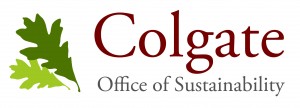by John Pumilio, director of sustainability
I frequently receive calls or emails from concerned individuals asking how to properly recycle or dispose of certain items that are either broken or no longer needed. Items could be anything from office supplies, furniture, microwaves, coffee pots, computers, monitors, small electronic devices, refrigerators, and almost anything else you can think of that is not part of our normal recycling program or too big to fit in one of our trash bins. This post will hopefully offer some guidance and give you more direction.
Let’s start with our basic campus recycling program. Colgate has two stream recycling which means that we need to separate recyclable materials into two different bins:
- Paper Recycling. One bin is for paper and all paper products. These blue bins are usually identified by having a lid with a slit that facilitates paper recycling. See image below (bin on left). This bin is for print and copier paper, newspaper, notebook paper, envelopes, magazines, and catalogs. Pizza boxes, cereal boxes, corrugated cardboard, paper bags, and dry food boxes can also be recycled with paper.
- Bottle and Can Recycling. The other bin is for bottles and cans that are made of plastic, glass, or metal. These blue bins are usually identified by having a lid with two round holes that facilitates the recycling of bottles and cans. See image below (bin on right). This bin is for all plastics #1-7, all glass bottles and metal cans, plastic milk and water jugs, yogurt containers, laundry soap and detergent bottles, and plastic grocery bags.
Paper and bottle/can recycling bins are located in every building on campus. Please take a moment to find and place your recyclables in the proper bin on campus. Check out Colgate’s Recycling Guide for more detailed information.
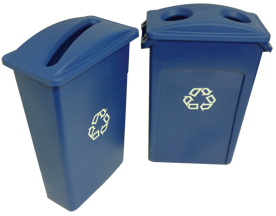
Slim Jim recycling containers frequently found around campus.
You will also see new recycling stations appear in more locations around campus. Like the ones pictured below. These stations work nicely in helping to promote recycling on campus.
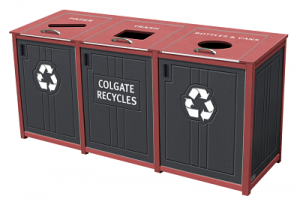
Colgate Custom-made Recycling Bin
Okay, that was the easy part. The following Frequently Asked Questions (FAQs) should guide you on how to properly dispose of other types of items.
Q: Can I recycle common food and beverage items such as drinking cups (plastic or paper or coffee), plastic utensils, napkins, clam shells, straws, plastic wrapping, or unattached bottle caps?
A: No. They should all be placed in the trash. This is hard to do for many people who care about recycling but we need to keep our recycling streams as clean as possible. As a general rule, “when in doubt, leave it out!” As a best practice, reattach bottle caps to the container, then recycle.
Q: What do I do with large electronic devices such as Colgate-owned television sets, computers, monitors, and printers?
A: Call the ITS helpline (x7111). They will assist you in the proper recycling of your Colgate-owned electronics.
Q: What do I do with small electronic devices such as old cell phones, batteries, compact discs, digital cameras, iPods, cables and cords, printer cartridges, calculators, and other small electronic devices?
A: Bring these items to the second floor of the Coop (in the elevator alcove) or to any one of our 16 locations around campus (download eWaste map here) where they will be recycled safely and conveniently. Members of the Sustainability Office will come around every few weeks to empty the electronic waste bins in your area. If a bin becomes full and needs more immediate attention, please call x6360 or email us at sustainability@colgate.edu.
Q: Where does our eWaste go?
A: Large electronic devices that are still functional will be reused. Large and small electronics that are no longer usable are transported to RCR&R in Rochester, NY for proper recycling. Click here to find out more.
Q: Where can I recycle my personally-owned eWaste?
A: As a Hamilton resident, you can take your electronic waste to the transfer station in Poolville (Cranston Road). They are open from 7:10 a.m. to 3:00 p.m. on Wednesday and Saturday. You will need a punch card to recycle electronics (punch cards cost $13.50 and contain 5 punches). Call 315.691.5700 with any questions. As a Madison County resident, you can also take your eWaste free of charge to Lojo Technologies at 634 Birchwood Drive (off of Stone Street) in Oneida. Hours are 8:00 a.m. to 3:00 p.m. Monday through Friday. Call 315.363.3014 with any questions.
Q: What do I do with my spent printer cartridges?
A: Fortunately, Staples will conveniently collect your old printer cartridges for recycling. Simply hand it to the Staples representative the next time they make a delivery to your office area. A second option is to place the cartridge in one of our eWaste bins located around campus.
Q: Can old clothing or textiles be recycled
A: Yes! But first you should always consider donating old clothing to charitable organizations in our area such as Worn Again Clothing, the Rescue Mission, or the Salvation Army. If you have old clothing or textiles that are beyond reuse, then place these items in a clear plastic bag and seal it. Then, set the textile recycling bag next to or on top of your other recyclables or recycling bins. Textiles are one of the least recycled items. The Environmental Protection Agency estimates that the average person throws away 70 pounds of clothing per year. Thanks for doing your part.
Q: How can I properly dispose of old medications and prescription drugs?
A: Madison County periodically schedules disposal events for old medications. Check the Madison County recycling website to see if an event is being planned. Also, some pharmacies are also offering take-back programs. Check with your local pharmacy to see if they offer this important service. If no disposal events are being planned near you, then throw the drugs in your household trash. Never flush them down the toilet unless the label directly instructs you to do this. Check out the FDA website for more specific information.
Q: Can I recycle Styrofoam?
A: As a matter of fact, yes! Madison County recently implemented a pilot program for Styrofoam recycling. You can take any foam packaging or clean egg containers to the ReUse Store on the east side of Buyea Road at Madison County landfill and recycling center in the Town of Lincoln. Styrofoam (not including foam cups, packing peanuts, or heavily soiled materials) will be accepted during regular operating hours (Tuesday through Friday, 7 a.m. to 3 p.m.). For more information contact Mary Bartlett, county recycling coordinator, at 1-800-721-2208 or see this article.
Q: I have an item (such as a microwave, refrigerator, lab equipment, furniture, shelving, filing cabinet, etc.) that is no longer needed or wanted. What do I do with these items?
A: First ask yourself if the item is still useable. If you think the item still has value and can be reused, then visit the Surplus and Salvage and call or e-mail Joanne Vanderwood (ext. 7475; jvanderwood@colgate.edu). She will help you post your items for reuse or resale at auction. If your item is broken or is not salvageable, then you must contact B&G to put in a work order for pickup. B&G will collect your item(s) for proper disposal.
Q: I have extra office supplies that I no longer need or want. What can I do with them?
A: Visit the Salvage and Surplus webpage and e-mail Joanne Vanderwood at jvanderwood@colgate.edu to have your items posted. If you have extra paper clips, folders, lamps, and other items that you think other people at Colgate might need, post it on the site. Likewise, if you are looking for common items, put in a request before spending money on new items.
Q: What do I do with scrap metal that is no longer needed?
A: Call B&G and put in a work order. They will come pick it up for recycling!
Q: Do you have links to other resources that explain how to properly recycle at Colgate or at home?
A: Yes! Check out these additional resources:
Colgate’s Recycling Guide and website
Madison County Solid Waste Department
NYS Electronic Waste Recycling
NYS Department of Environmental Conservation (DEC) – recycling and composting
Q: I still have an item or questions about recycling, what should I do?
A: Call (x6487) or email (jpumilio@colgate.edu) Colgate’s Director of Sustainability. I will be glad to help.
Save





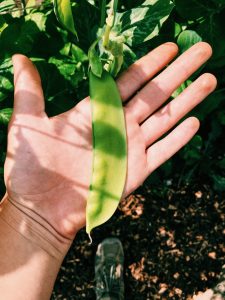
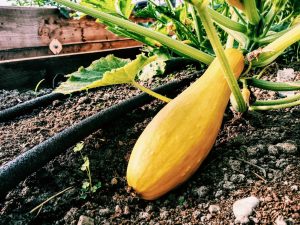
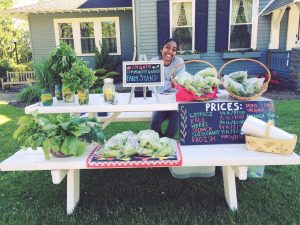
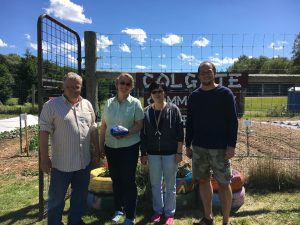
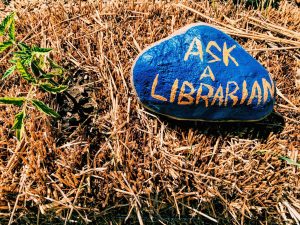

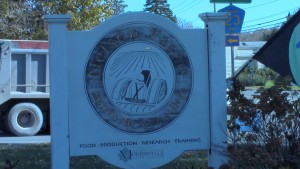 By: Mackenzie Hargrave ’16 (Environmental Economics Major from Madison, NJ), Sustainable Dining Intern
By: Mackenzie Hargrave ’16 (Environmental Economics Major from Madison, NJ), Sustainable Dining Intern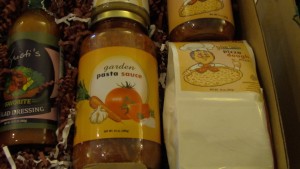 gredients maintain the appropriate pH, they must be carefully coded and tracked, according to FDA regulation.
gredients maintain the appropriate pH, they must be carefully coded and tracked, according to FDA regulation.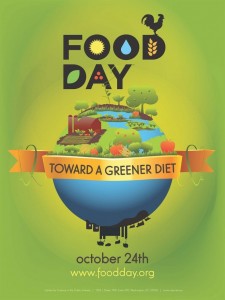
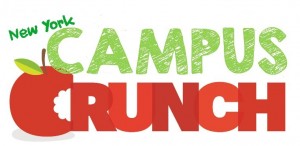 On Thursday, October 22nd Colgate will join campuses throughout the state to take the New York Campus Crunch. Local apples will be distributed at Frank Dining Hall, The Coop, and Hieber Café for a “collective crunch” at 1pm. Come out to support New York apples and the orchards and farms our food is grown on.
On Thursday, October 22nd Colgate will join campuses throughout the state to take the New York Campus Crunch. Local apples will be distributed at Frank Dining Hall, The Coop, and Hieber Café for a “collective crunch” at 1pm. Come out to support New York apples and the orchards and farms our food is grown on. 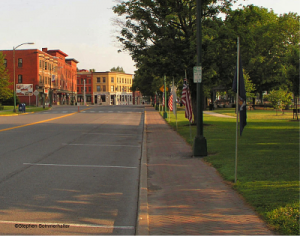 The benefit of buying local goods, mostly produce, has, of late, been
The benefit of buying local goods, mostly produce, has, of late, been 
